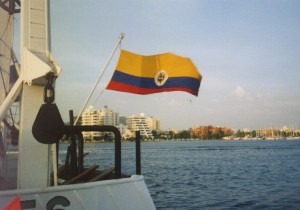 A new study published online in Marine Policy last week shows that Colombia, like many other countries around the world, has been underreporting its marine fisheries catches. From 1950–2006, the Colombian catch may have been almost twice the landings reported by FAO on behalf of the country (2.8 times higher in the Atlantic Ocean fisheries; 1.3 times higher in the Pacific Ocean fisheries). Jeffrey Wielgus, a former visiting researcher with the Sea Around Us Project, is lead author of the study and Sea Around Us members Dirk Zeller and Rashid Sumaila are co-authors. The fourth author, Dalila Caicedo-Herrera, is a Colombia-based fisheries researcher. The article is titled: Estimation of fisheries removals and primary economic impact of the small-scale and industrial marine fisheries in Colombia.
A new study published online in Marine Policy last week shows that Colombia, like many other countries around the world, has been underreporting its marine fisheries catches. From 1950–2006, the Colombian catch may have been almost twice the landings reported by FAO on behalf of the country (2.8 times higher in the Atlantic Ocean fisheries; 1.3 times higher in the Pacific Ocean fisheries). Jeffrey Wielgus, a former visiting researcher with the Sea Around Us Project, is lead author of the study and Sea Around Us members Dirk Zeller and Rashid Sumaila are co-authors. The fourth author, Dalila Caicedo-Herrera, is a Colombia-based fisheries researcher. The article is titled: Estimation of fisheries removals and primary economic impact of the small-scale and industrial marine fisheries in Colombia.
Consumer Campaigns, Pig Feed, and Conservation
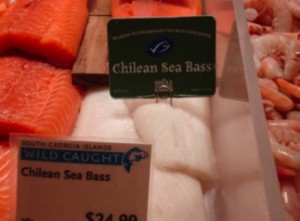 An article titled Conserving wild fish in a sea of market-based efforts appeared last week in Oryx: The International Journal of Conservation authored by Jennifer Jacquet, Daniel Pauly, Rashid Sumaila, and Sherman Lai of the Sea Around Us Project, along with five additional colleagues. Its publication led to an article in the Vancouver Sun on how domestic farm animals are devouring the world’s fish stocks and an AFP piece explaining that consumer campaigns don’t save endangered fish. The article addresses the effects of consumer campaigns in an increasingly globalized market for seafood.
An article titled Conserving wild fish in a sea of market-based efforts appeared last week in Oryx: The International Journal of Conservation authored by Jennifer Jacquet, Daniel Pauly, Rashid Sumaila, and Sherman Lai of the Sea Around Us Project, along with five additional colleagues. Its publication led to an article in the Vancouver Sun on how domestic farm animals are devouring the world’s fish stocks and an AFP piece explaining that consumer campaigns don’t save endangered fish. The article addresses the effects of consumer campaigns in an increasingly globalized market for seafood.
Sumaila Asked to WTO and British House of Commons
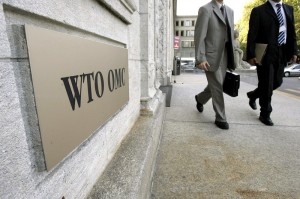 At the end of October, the Sea Around Us Project’s economist and director of the Fisheries Economics Research Unit Rashid Sumaila teamed up with Oceana spokesperson Ted Danson to meet with WTO Director-General Pascal Lamy to discuss the most recent estimates of global fisheries subsidies and the current state of WTO negotiations on this issue. The Economist reported on the fisheries subsidies discussion, particularly fuel subsidies here.
At the end of October, the Sea Around Us Project’s economist and director of the Fisheries Economics Research Unit Rashid Sumaila teamed up with Oceana spokesperson Ted Danson to meet with WTO Director-General Pascal Lamy to discuss the most recent estimates of global fisheries subsidies and the current state of WTO negotiations on this issue. The Economist reported on the fisheries subsidies discussion, particularly fuel subsidies here.
Global fisheries subsidies are estimated to be $25-$30 billion a year and encourage overfishing as well as undermine free market philosophy. The current Doha Round of the WTO is an apt forum for discussing and disciplining harmful subsidies, estimated at $16 billion per year.
From the WTO meetings in Geneva, Switzerland, Sumaila traveled to London to the British House of Commons for another meeting between legislators and scientists. The Marine Advisory Group of GLOBE International, a group that supports political leadership on issues of environmental sustainability, gathered to discuss overfishing.
Sumaila found the legislators involved, a multipartisan group primarily from the UK, to be enthusiastic, particularly the MP from the same region as author/journalist Charles Clover. According to Sumaila, the legislators were very keen on receiving scientific information and data and urged the scientific advisors involved to share their findings candidly.
The Marine Advisory Group will continue to work with Globe International to produce a policy document, which should be completed early 2010, to be taken back to member countries, and presented at a number of UN meetings next year.
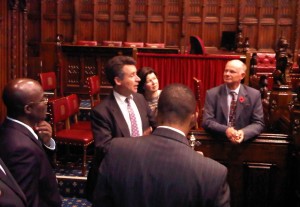 Sumaila, far left, at a meeting of the Marine Advisory Group of GLOBE International in the UK House of Commons.
Sumaila, far left, at a meeting of the Marine Advisory Group of GLOBE International in the UK House of Commons.
Daniel Pauly Contributes to the Huffington Post
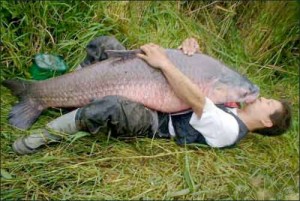 Daniel Pauly published today an article on Fish As Food: A Love Affair, Issues Included in the Huffington Post. His article begins: Imagine the evolution of a relationship, when the delight in discovering a new lover is followed by the discovery of his or her issues, which eventually leads to the relationship being reassessed, however painful this might be. I speak here about seafood, discovered by many only in the last few years. Read the full piece here.
Daniel Pauly published today an article on Fish As Food: A Love Affair, Issues Included in the Huffington Post. His article begins: Imagine the evolution of a relationship, when the delight in discovering a new lover is followed by the discovery of his or her issues, which eventually leads to the relationship being reassessed, however painful this might be. I speak here about seafood, discovered by many only in the last few years. Read the full piece here.
Daniel Pauly on NPR’s Fresh Air
Satellite Imagery Can Improve Ocean Data
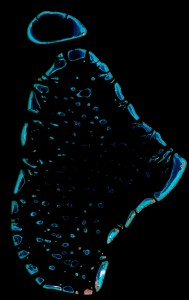 How much the oceans are protected? How much of the globe is covered in coral reefs? These are important questions that require decent data. A new study led by Sea Around Us Project member Colette Wabnitz and just released online by the journal Frontiers in Ecology and the Environment reveals that the current data available are too poor for them to be used to evaluate progress toward conservation targets, such as international goals to set aside 20-30% of the oceans as marine protected areas. Technological advances in satellite imagery, like this image of the North Male atoll in the Maldives, can help us better determine the true size of coral reefs, mangroves, seagrass, spawning grounds, and other vulnerable marine habitats. Read the full study here.
How much the oceans are protected? How much of the globe is covered in coral reefs? These are important questions that require decent data. A new study led by Sea Around Us Project member Colette Wabnitz and just released online by the journal Frontiers in Ecology and the Environment reveals that the current data available are too poor for them to be used to evaluate progress toward conservation targets, such as international goals to set aside 20-30% of the oceans as marine protected areas. Technological advances in satellite imagery, like this image of the North Male atoll in the Maldives, can help us better determine the true size of coral reefs, mangroves, seagrass, spawning grounds, and other vulnerable marine habitats. Read the full study here.
Climate Change Will Affect Ocean Food Supply
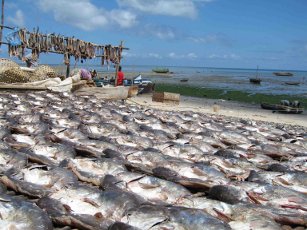 Major shifts in fisheries distribution due to climate change will affect food security in tropical regions most adversely, according to a new study led by the Sea Around Us Project’s William Cheung (now based at the University of East Anglia in the UK). The study, published today Global Change Biology, finds that climate change will produce major shifts in productivity of the world’s fisheries, affecting ocean food supply throughout the world, most particularly in the tropics. Read the full press release here and a summary of scientific findings and some of the major maps and graphs from the climate change study here . The Pew Environment Group also put out a report on the study in their Ocean Science Series.
Major shifts in fisheries distribution due to climate change will affect food security in tropical regions most adversely, according to a new study led by the Sea Around Us Project’s William Cheung (now based at the University of East Anglia in the UK). The study, published today Global Change Biology, finds that climate change will produce major shifts in productivity of the world’s fisheries, affecting ocean food supply throughout the world, most particularly in the tropics. Read the full press release here and a summary of scientific findings and some of the major maps and graphs from the climate change study here . The Pew Environment Group also put out a report on the study in their Ocean Science Series.
Aquacalypse Now
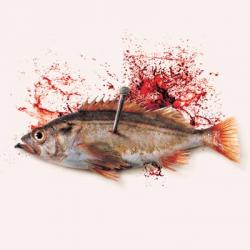 Daniel Pauly writes an article on overfishing for The New Republic. Read the full piece here.
Daniel Pauly writes an article on overfishing for The New Republic. Read the full piece here.
Dalal Al-Abdulrazzak – Ph.D. Student
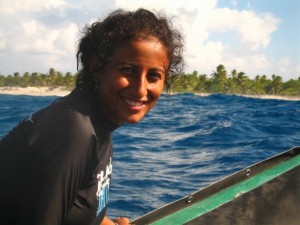 Dalal has always had an affinity for the ocean. Born and raised in Kuwait, she spent her youth exploring the coral reefs, mudflats and sea grass beds of the Persian Gulf. In 1991 she witnessed first hand the devastating effects of war on the local environment and vowed to do everything she could to restore it.
Dalal has always had an affinity for the ocean. Born and raised in Kuwait, she spent her youth exploring the coral reefs, mudflats and sea grass beds of the Persian Gulf. In 1991 she witnessed first hand the devastating effects of war on the local environment and vowed to do everything she could to restore it.
After graduating with BA in Environmental Studies from Middlebury College, VT, Dalal received a Watson Fellowship to travel to Panama, the Bahamas, New Zealand, Fiji, Palau, the Seychelles and South Africa to research the extent to which cultural context influences elasmobranch conservation efforts. Armed with nothing but a 5kg backpack and 20kg of SCUBA gear, she spent a year backpacking solo, logging over 200+ dives, and coming face to face with bull sharks, tiger sharks, great whites, and giant mantas. During this time, she also slept on 66 different beds, ate 9 jars of peanut butter and took 5, 538 photos.
She briefly returned to the “real world,” working as a research assistant to Dr. Jeremy Jackson at the Scripps Institution of Oceanography, where she investigated the environmental and economic effects of the “rats and cockroaches” of the ocean, (i.e. the invasive species that will become permanent components of ecosystems).
Dalal comes to the Sea Around Us to work under the supervision of Dr. Daniel Pauly. Her research interests lie in the historical marine ecology of the Persian Gulf. Through a variety of historical documents she hopes to assess and quantify changes in the distribution and abundance of marine species in the Gulf, in order to establish more accurate baselines from which to measure changes. Her main goal is to understand the relationship between social history and changing marine environments in hopes of more successfully managing marine resources.
Daniel Pauly Speaks at IMCC
Daniel Pauly gives the keynote address at the International Marine Conservation Congress.


